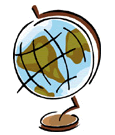Learn about the colonization of Canada and how Canada became an independent country.
 Objectives:
Objectives:
- Students will understand that the French were the first Europeans to set up colonies in Canada.
- Students will understand when and how English colonies were established in Canada.
- Students will be able to describe how Canada became an independent country.
- Students will be able to name the first Prime Minister of Canada.
Suggested Grades:
4th Grade – 5th Grade – 6th Grade
Procedure:
- Read lesson or have students read it silently.
- Have students answer the questions on the worksheet.
- Discuss answers to questions.
Lesson Excerpt:
Like the United States, Canada is a nation of immigrants with an interesting history. In 1534, the French explorer Jacques Cartier arrived in Canada while searching for a westward route from France to Asia. He found a land rich in forests, furs and fish. Other French settlers soon came to Canada, and in 1608, Samuel de Champlain started the first French Canadian colony in the Great Lakes-St. Lawrence Lowlands. The colony was called New France. French settlers became friends with the native Huron Indians and quickly established profitable fur trading posts throughout New France.
In the mid-1700’s, New France came under British control as a result of the French and Indian War. Canada was ruled by Great Britain until 1776, when the American colonies rebelled. French Canadians did not follow their American neighbors in rebellion against Great Britain, and when the American Revolution ended, many colonists who had remained loyal to Britain and not fought for independence moved north to Canada. Some British Loyalists settled on the island of Nova Scotia, while others moved to the mainland and established the colony of New Brunswick. Many more moved to the Great Lakes-St. Lawrence Lowlands region. There, British Loyalists found themselves in conflict with French Canadians. The conflict grew so heated that Great Britain finally divided the region into two colonies in 1791. The two colonies were Quebec (French) and Ontario (English).
 Objectives:
Objectives: